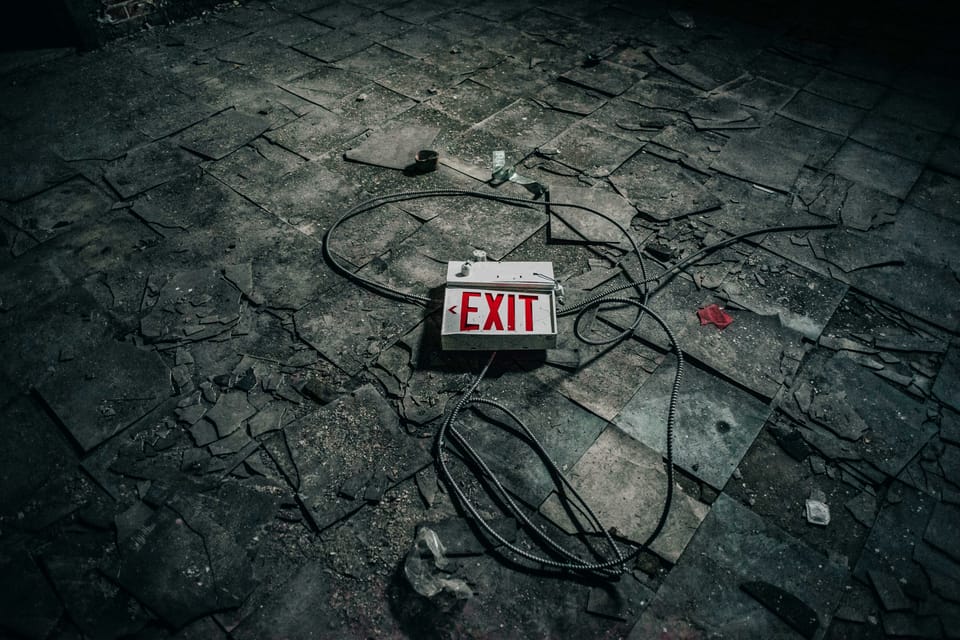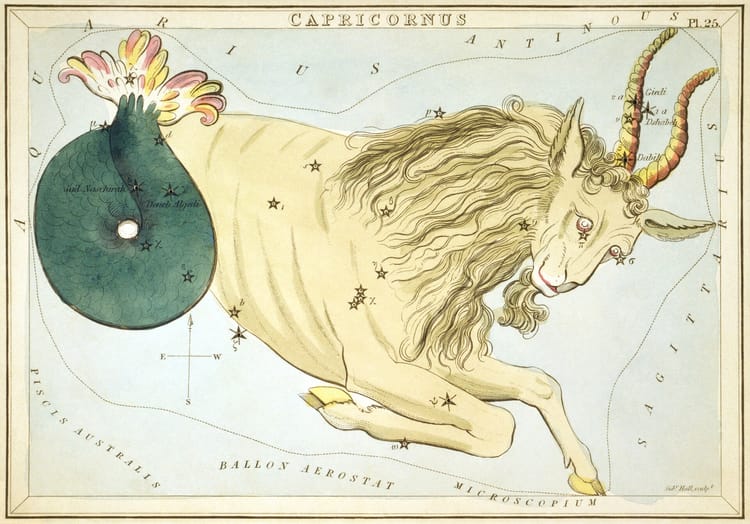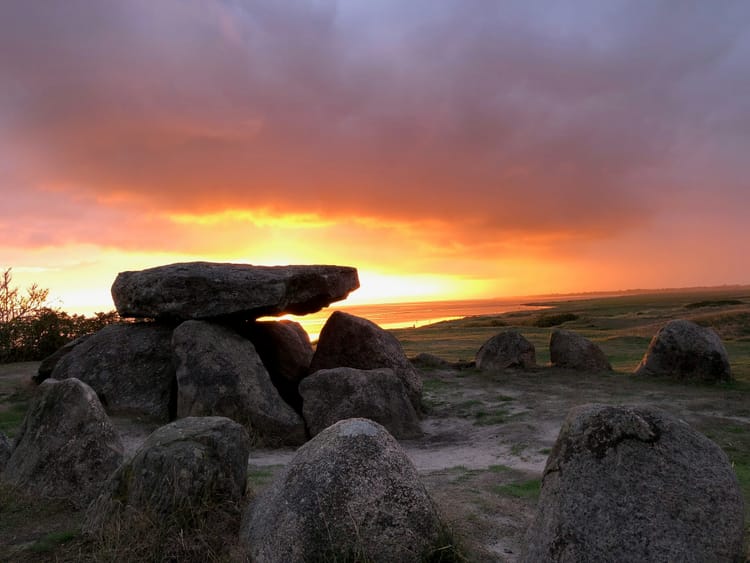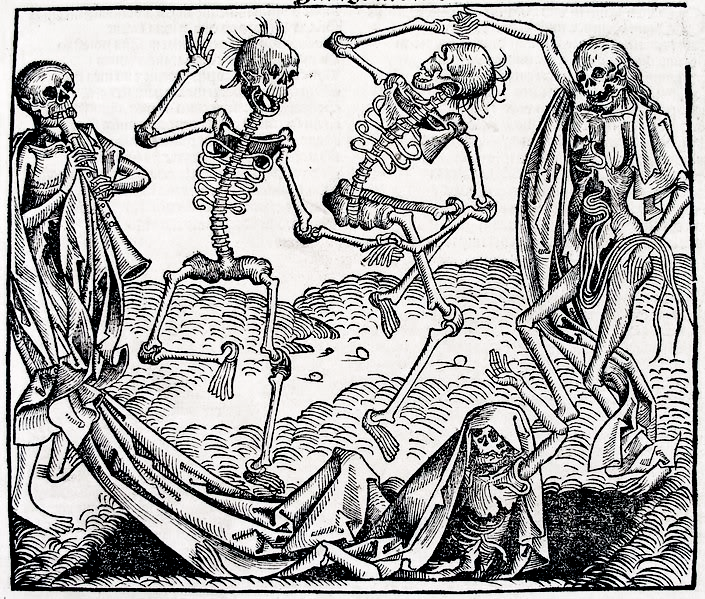Last Quarter: Progress does not exist

Hello. It's Friday (though a little late). In the wake of yesterday's nor'easter, probably and hopefully the last until autumn, I started writing this post while watching snow drip from scotch pine needles and listening to an excited robin and some screaming blue jays. During the storm, our home didn't lose electrical power, so my owner and I sheltered comfortably; although there might still have been the risk of damage to this shelter through falling tree limbs or water intrusion, that electricity's presence was the most integral to feeling like a winter storm was no threat to us.
If we had lost power, it would have been in multiple senses: we rely on electricity here to move around easily when it's dark outside, to run appliances that make housework much simpler and preserve our food, to make our internet work, to have our thermostat call to our furnace for heat, and to have the furnace actually ignite the gas that's fed to it. Likewise to run the air conditioning in summer. We don't yet have a generator configured. When an outage does happen in our neighborhood — about two or three times a year — life suddenly becomes much less comfortable, and much less safe. Our only coping mechanisms at the moment are stockpiling candles, flashlights, crank lanterns, and solar lanterns; igniting our stove burners to cook by opening the gas and holding up a candle lighter (or weather permitting, using our fire pit); preparing fresh ingredients for a meal as soon as possible so that they don't spoil, then moving on to frozen things, nonperishables, takeout, and so on.
I often think we've gotten lucky since the outages here usually don't last more than eight hours or so.[1] The worst part is how when we lose power in the area, cell service also tends to vanish, so we can't even communicate long-distance with other people or know what's going on with the weather apart from one-way reception through a fancy little radio I bought the other year. (Yes, it even gets shortwave, though I'd find that more useful if I also had a shortwave transmitter.) But while all of this is of course a survivalist's nightmare from some angles, it's a wet dream for the more fetishistic types: suddenly living with less modern amenities, it's like "traveling back in time."
When those people go on about how much they love getting by on the same "simple" things that some of our earliest ancestors did — like fire, basic hand tools, or finding food by hunting and gathering — they might seem to be part of a certain political fringe, either on the gun-hoarding, compound-building right or a bit more of the Ted Kaczynski type (not exactly of the right, but too anti-left to be of the left, and wrapped up in some really unfortunate ideas or practices anyway). However, this isn't a guarantee, and their mindset exists on a continuum with historical reenactors who profess all sorts of politics, and with eco-activists at all levels of society who have been spreading the gospel of degrowth — which is the ethos of decreasing the size of our economies and implicitly the scope of globalization, on the grounds that it's only possible to continue at our current scale if we also continue our behaviors that may soon destroy a frightening percentage of life on earth, maybe even ourselves. In the course of degrowth we may, as these people acknowledge, need to abandon some things that we think are nice and even some things we currently view as necessary, for the sake of living more sustainably.
I'm not going to write today about specific voices and arguments in the degrowth movement, but I do think it's time for me to write about some of the philosophies that surround it and interact with it, which also inform some political divides in environmentalism and on the left — or even with the whole concept of being a radical opposed to the status quo.
I'm going to share some reflections about philosophies that nowadays tend to be summed up with buzzwords like anti-civ(ilization), anti-tech, and countermodern. I'm not a classical anarchoprimitivist because I think that school of thought tends to idealize and objectify indigenous hunter-gatherer lifestyles without really understanding how indigenous communities operate or how and why human societies evolve; and in the worst case scenarios, anarchoprimitivism or "anprim" slides into ecofascism, wherein people endorse eugenics-like practices of abandoning or culling those they see as weak or leeches on the natural order, and worse. However, I know most degrowthers, most eco-anarchists, most decolonial and/or indigenous activists, etc. are not of that persuasion, and these days I tend to view myself as fairly civilization-critical, tech-critical, modernity-critical.
As far as I can tell, humans do not recognize neither the nature of the crisis we're in — the great dung ball, the metacrisis, the polycrisis — nor what to do about it unless they develop awareness around how many things Euro-colonial, capitalist modernity has taught us to assume as inevitable or necessary, when although we might severely regret the loss of some of those things, the other things are in fact quite arbitrary and we might be able to get on pretty well without them, maybe even ought to. Most of all, while activists, scientists, and policymakers may still be debating the merits of degrowth, it's not really up for debate that to survive an eco-apocalypse, some facet of modern technology and civilization has to be "reverted" back to a more localized, slower, older form. For instance, the very nature of air travel is such that although it would help a lot for millionaires and billionaires to just stop flying their private planes everywhere, carbon levels in the atmosphere are so high that we should really, really consider ceasing all plane activity for at least a while, returning to trains for most trans-continental journeys (both for freight and passengers) and investing in lower-emission ships for crossing the oceans, which is decidedly more plausible than creating lower- or zero-emission jet engines at this time.
So the real question is not whether we have to get rid of some things that are popularly regarded as signs of human "progress." The question is which things, and to seek the answer we must stop thinking about "progress" as a one-way phenomenon or maybe even as a real thing at all.
Not back to the past, but bringing the past forward
The standard and very reasonable objection to trying to live more "like we did in the past" is that choosing to undo most modern developments, or to operate with far fewer modern amenities than what centralized, industrial capitalism allows us to, would reduce quality of life and our lifespans themselves. Hand in hand with this objection, we encounter the idea that older cultures assumed the wrong things about the nature of reality and were generally more oppressive. In many ways, I sympathize and agree with this desire to stay living in an era where for example we have incontrovertibly good medical technologies like antibiotics and vaccines[2], along with other chemical interventions and assistive devices for people with disabling chronic health conditions. I probably would have died at age 4 from pneumonia if it weren't for modern "Western" medicine. And likewise I understand that since a lot of people who do yearn to live in the past are reactionaries who envision that past as a place where, say, women were universally barefoot and pregnant in the proverbial kitchen, this makes many frameworks of life-in-the-past pretty unpalatable.
Such are the pitfalls of glorifying any monolithic concept of ancient history or so-called primitive cultures as "perfect." However, when people in the conservative political realm look at the past as some patriarchal, heteronormative, white supremacist paradise, they aren't really looking at all of history, they're looking at the parts of history where that kind of hegemony prevailed. When people in the neoliberal political realm see the same past and just view it as a bad thing, they too are only seeing a part of the whole, and their concept of it is often not even accurate. Both of these groups of people are also making the same mistake of viewing human development as a straight line. On the far right, this straight line is one of deterioration, the collapse from a golden age; for the neoliberal, the straight line is the inevitable drumbeat of human progress.
Reality is far, far more complicated than this. Sometimes over the years a few parts of human existence manage to get better, and sometimes other parts get worse. We do not evolve our societies toward anything objectively good or bad, but rather we evolve these societies toward what makes sense to us at that time, and the outcome either turns out well or it turns out very poorly. There has rarely, if ever, been a period of human history where everything we do has been exquisitely configured to make our lives miraculously happy and to keep us in harmony with all the universe — and very importantly, we probably can't achieve such a period either.
True, we perceive that time itself is linear and that this may be in accordance with the second law of thermodynamics, which suggests that we're in a closed system where entropy can only increase. But as various thinkers besides myself have pointed out over the years, entropy in human culture can only increase if the system is closed, as facilitated by ideologies like capitalism that demand infinite growth — whereas we could instead be creating open feedback loops to turn our waste into something useful and to likewise release excess before it can become waste at all. We could be living by the first law of thermodynamics instead, where energy is neither created nor destroyed.
And the fact of the matter is that the less "advanced" a culture is, the more likely it is to maintain that sort of balance. This isn't to say that mandatory entropy buildup is exclusively a feature of capitalism, for its predecessor can be found in overall imperialism, which is thousands of years old; the ethos there is extract, extract, extract from the surrounding landscape, in order to feed the central cities, no matter how deleterious the effect on the lands and peoples you've pulled from. But as ancient as empires can be, even back then they have always regarded themselves as more advanced, more civilized, than the less extractive, less centrally-governed, and (though this is still debatable) less urbanized peoples around them. And of course, this doesn't mean that those civilized centers have actually offered a superior quality of life to smaller communities in the surrounding territories; it's just helpful propaganda for the ruling class to say this is so.
Some potent examples of this can be found in David Graeber & David Wengrow's masterpiece The Dawn of Everything, which I've discussed here a few times. One case I'd like to highlight is how the writers dispel the myth that democracy[3] conceptually emerged in Europe and was spread to the rest of the world as a silver lining of violent colonization.
Although Athenian democracy (its own flaws aside) was an inspirational prototype cited by many purported democracy-builders in the late 18th century, in between the Athenian experiment and the United States' "Founding Fathers" there was precious little going on among Euro-descendant peoples that would suggest a common political philosophy emphasizing the value of every person in a community deserving their fair say in how life is conducted. Yes, there are a couple of iconic political developments that we can point to like the signing of Magna Carta, but the general European tendency from ancient Rome through the late Renaissance was immensely hierarchical societies where human rights absolutely did not exist in any theoretical framework. As Graeber & Wengrow demonstrate, the Euro-style concept of democracy was almost certainly derived from something invented in the Americas, but not by white settlers — rather by indigenous Americans, primarily the Haudenosaunee (Iroquois) Confederacy.
This is a somewhat reductive way of putting it, but prior to colonial invasion, and indeed even in the early stages of it, life in a tribe that belonged to the Haudenosaunee was markedly better than a European's by just about any metric. Distribution and amount of labor was quite equitable, as were community resources, and reactions to interpersonal transgressions did not take the carceral form that's become the colonial norm today. People lived well without the requirement that they do anything to "earn" that living, and without fear of having certain basic rights taken from them. They governed themselves with a highly sophisticated decision-making system that blended the expertise of elders with the assurance that even less-expert people could still have the right idea about how to solve a problem. When coming into early contact with French and English settlers, the Haudenosaunee reacted with surprise and alarm about how unjust these other people's societies were, and it seems to be that by learning about more democratic structures from the Haudenosaunee and other indigenous neighbors, European democracy theories eventually developed.
None of this meant there weren't intra- and intertribal conflicts, especially not with tribes outside the confederacy[4], and none of this should be interpreted as a reason to see indigenous peoples of this continent as the "noble savage" archetype, leading lives of liberty, equality, and fraternity just because they're too ignorant to create the kinds of civilizational "advances" that require sacrificing their carefree ways. Just as Graeber & Wengrow are careful to contradict such thinking during their own analysis, I want to emphasize how the highly equitable lifestyle of the Haudenosaunee and many other tribal groups of this continent (and beyond) never arose from some sort of innocence. These peoples had, and have, survived for tens of thousands of years by learning what does and doesn't work for that survival, and in their experience it often turned out to be pro-social, altruistic, ecologically embedded, communal support systems, not back-biting dog-eat-dog Hobbesian myths. Sticking with those systems requires very, very deep intelligence, and Euro-descendant peoples lost that same intelligence for a while when our relationship with the more-than-human world was cut away from us in bits and pieces.
Even when the cutting began, some parts of our lives were still much richer than they are now. I always come back to the Middle Ages with this. Frequently that time period in European history is stereotyped as full of disease, dirt, misogyny, and ignorance. The disease part is certainly true since humans always died of disease much more frequently before the 20th century; however, the rest is a very odd projection.
Where dirt is concerned, Protestant fear of baths trended for a short while prior to the Victorian era, but this wasn't because earlier Europeans didn't understand cleanliness; they and all peoples outside Europe always displayed a general preference for being clean instead of being dirty, and knowing that water and things like soap or oil can assist with this. Availability of water to use for bathing — and the places to do so — have fluctuated over the years, so a medieval European wouldn't have washed as much as we do now, but they still did it rather regularly, even in lower classes.
Where misogyny is concerned, there were certainly many ways in which living as a woman in medieval Europe wouldn't allow for the autonomy we prefer today, and the laws meant to protect women were fairly patriarchal in focus (such as punishing rapists for the debt owed to their victims' fathers or husbands, not the victims themselves). However, many women still had more freedoms and political power than they would have by the advent of capitalism and Protestantism, when an ideology of misogny was deliberately perpetrated to rob women of land, influence, and traditional knowledge bases.
Where ignorance is concerned, medieval Europeans did understand their world rather differently than their modern descendants would, but the question shouldn't be how much they knew, and rather what kinds of things they knew. A medieval peasant had to be a fountain of agricultural wisdom and trivia, or they wouldn't make it very long. Few people were literate, but they still practiced elaborate craft and art traditions that have lasted into the present day. Not everyone could meaningfully articulate why the world was round, but they already knew that it wasn't flat. Nor did they have an accurate theory of how diseases spread or how to treat them, but they still had community healers who were probably able to provide much more emotionally connected one-on-one care for their neighbors than what the modern medical industrial complex affords.
In some ways I'm being too kind to the Middle Ages because of course it's also true that peoples in other parts of the world during the same time period were faring much better and definitely had some technologies, knowledge bases, and social structures that it might have done medieval Europeans a wealth of good to have access to. Consider the developments of the Islamic Golden Age, for example. But I also specifically raise the Middle Ages because both in the popular imagination and in the actual historical record it does describe a historical period where Europe was a backwater region possessed by the new Christian cult; even within those limitations, though, life in that time-and-place probably felt less hopeless than neoliberal progress narratives expect us to believe.
From this, we should be able to regard examples of life outside the modern Euro-colonial capitalist paradigm as something other than perfect blueprints for the future, and rather as simple reminders that we can live differently than we currently do.
What the land demands
Despite where I've started, looking at the ups and downs of the past or the variations in human cultures, can initially be maddening once you strip the progress narrative away. What are we supposed to make of all the things we've gained or lost over the millennia? If there never was and never will be an ideal time to be alive, does this mean we should become nihilists striving for nothing in particular, or that we should become wimpy reformists mumbling the meme we should improve society somewhat? What does improvement even suggest, if it's only relative to the situation we're currently in? How do we know if the improvement we've created is actually going to be a detriment later on?
To some extent, I think we need to make peace with not knowing. However, we can also start by tossing out worship of "innovation." Sometimes we improve our lives by bringing in a new tool or a new custom, but other times we improve our lives by reverting to something that worked well earlier. The neurosis of conservatism asks us to always perform this reversion, but the progress myth of neoliberalism asks us to always perform the former. While I of course never hold with kneejerk conservatism itself, I think that a major part of decolonizing my mind has meant reckoning with how traditional tribal communities are often slow to adopt changes. This slowness is not because of reluctance to adapt, but rather because of caution around doing something simply because it's new. Newness destabilizes reliable patterns.
(And we're expected to believe that autism is a modern condition.)
But even with this semi-universal tenet to bear in mind, what comes out of a fundamentally open but cautious, innovation-wary approach to managing a society is not going to be the same across every community that practices it. As Tyson Yunkaporta has spoken about, the law is in the land. Our physical geographies and seasons are the best point of reference for what we, who live right here, need to be doing with ourselves. And since there is variability in these features across the globe, there must be variability in cultures too.
Having said that, I do think there is one guaranteed outcome of listening to the land, which is that to do so we must live more closely with it and we cannot be in extractive relationships with it. This either nixes industrialism or requires us to enormously scale down industrial production and distribution — perhaps using factories to create certain things, but only in batches sized for what people actually need, and making sure these small production facilities can be set up and managed by staff in a very decentralized way for communities across the globe. No central facilities where the entire world supply of x life necessity is wastefully shipped everywhere instead of made closer to home.
It goes without saying that capitalism itself, the profit motive that underpins it, and the consumer ideology that fuels it must all be done away with as well. And if we do this along with breaking down modern industrialism, then the nation-state as we know it evaporates by default because it can't sustain itself. Communities inherently get much smaller. The questions to therefore ask, then, are: do these communities actually become less connected, or do they still preserve global communication in some form? and in losing industrial, extractive modes of production, what technology does that mean we would have no choice but to give up?
"Low-tech isn't no-tech"
I've put the above phrase in quotes because I find it both provocative and correct, but I'm not necessarily convinced that my own tech-critical stance altogether qualifies as "low-tech." Yes, choosing low-tech over no-tech means acknowledging that some technological developments past, say, the Paleolithic were good, which works for me because I'll never entertain arguments that it was a mistake for us to ever evolve tools at all — and a tool, any tool, is a technology by definition. However, "low-tech" as a de-industrializing, degrowth standard could still imply some conflicting or overlapping possibilities. It might mean:
- Using types of technology that pre-date modern industrial manufacturing and can therefore be created without it
- Using modern types of technology that can still have their production scaled down
- Using the scaled-down modern tech but also choosing from a vastly smaller array of fields where modern tech "should" vs. "shouldn't" belong
- Using an array of pre-modern vs. modern tech but specifically excluding anything that needs a permanently extracted resource (such as combustion engines)
- Using existing modern tech for as long as it stays functional, but making sure all new tech that replaces it will fulfill sustainability requirements
- Developing tech at an intentionally slowed rate to allow for better analysis of socio-ecological impact
Choosing one or more of these routes (or some alternative) would create ripple effects for which genuinely useful, net-good technology we might still need to sacrifice. So I think that perhaps we can't just assert some moral position on what "low-tech" ought to be, or even definitely say that going low-tech is the moral position. Instead we need to start doing an inventory, person by person and community by community, on what modern tech is indispensible and what tech isn't.
A few vital modern technologies that come to mind for me.
Medicines
Not necessarily most pharmaceutical medications as we know them, but equipment to create and dose foraged medication from plants with modern pharmaceutical precision. At this point, it's really not in dispute that herbalism can successfully treat a huge array of ailments, but the challenges with it are a) controlling the amount of a plant's active ingredients that a patient uses, b) knowing how much of that ingredient is available in the harvested specimen, and c) knowing which medical applications of this plant are actually provable vs. legendary.
All three of these challenges would be handled in various ways among indigenous communities where generations of knowledge about immediately local flora would help inform empirically-based decisions about herbal treatments; but to accrue that knowledge while "re-indigenizing" would take a number of generations that we settlers don't have time for when we need to transition away from industrialism as soon as possible.
We also ought to preserve some synthetically produced medications and relevant equipment when they can be used for treating terminal illnesses and various severe long-term conditions. Likewise for antibiotics (even if more direct fungal treatments might sometimes work) and vaccines.
Long-distance communication & electrical implications
I think that even with the pitfalls of the contemporary internet, some kind of real-time networked communication between communities is a transformatively valuable tool that we have no reason to get rid of even if we could maybe stand to use it less than we currently do. Imagine sending text, a picture, or your voice to someone far away with the assurance your message would get there almost immediately, but not having the capitalist pressures to expect an immediate reply.
This would presumably necessitate preserving a means of generating electricity, which would be good since I can't see much sense in abandoning refrigeration. We could get away with losing electrically-powered air conditioning, perhaps — everyone's ancestors got by fine without it — but now I think it would only happen by making some significant changes to common architecture, still using heat pumps in many cases, and recognizing that in an overheated world it would be impossible to live in some parts of the world without an artificial cooling method.
What else?
I could keep this list speculatively going or form an entire second post out of it, but it's not going to lead me any closer to easy answers tonight. The catch to all this low-tech thinking, for me anyway, is my own lack of expertise. I know some people are working on developing pharmaceutical labs-in-a-box, but I can't yet explain to you how those things work; I also don't know all the chemicals you would need to synthesize for chemotherapy drugs, for example, or if there's a non-industrial, non-extractive way to make them. I don't know if you can maintain a long-distance communication network that runs on metal wires and radio signals and have absolutely no environmental damage in the process.
So in a way, I hope people — myself included — can think more about these tech questions simply to start finding out what it would take to preserve what we do need.
Laying progress to rest
I don't look forward to this apocalypse, because it seems an unambiguous tragedy that our unjust world couldn't even birth a new one without massive extinctions and grotesque suffering. The effects of the oncoming collapse may be a moral blight on our planet that never goes away, even if future life physically and emotionally recovers.
But in our anticipatory grief, we must be mindful that one day the new world will exist, and we as ancestors will play a role in shaping it, so now is the time to start thinking about what parts of the old world can rightfully be preserved vs. left behind. Not out of a belief in linear progress, but out of the call to merge a few pearls of the civilizational experiment with the more reliable practices of our ancestors who never needed civilizing.
I shrink from recommending "joy," a slightly rhetorically abused sentiment these days; but hope is always good. That hope won't come from writing the next Unabomber manifesto, starting up another solitary cabin in the woods, and murdering people. The hope comes from finding the people who you (I) would be ready to figure out a highly local and at least less modern way of life with — either because we'll need to, or because these skills need to be retaught to the next generations.
Let's start experimenting, and let's start learning.
[1] In childhood the April Fools' Blizzard of '97 knocked out my family's electricity for four days. We had to stay at a hotel, leave the taps running, and visit the house repeatedly to drain our water heater to make sure our forced-water heater pipes didn't burst. It was far less unbearable than what some people deal with in more isolated, less affluent areas, especially since we had the luxury of exiting the house at all; but I think my current household is only halfway equipped to deal with being cut off from the main electrical grid for that long.
[2] Even if the development of these technologies has had a troubled sociopolitical history.
[3] Which I do consider a good governing principle, even if most places that call themselves democracies are not half as democratic as they claim.
[4] It's worth acknowledging that as far as I understand, the tribes of the Haudenosaunee may have politically dominated surrounding communities, so this doesn't mean there was a perfectly equal playing field across this region of Turtle Island. That said, I'm the opposite of qualified to explain that situation any further.
Thank you for reading. Before my next Friday post, subscribers should be sure to look in their inboxes on Monday as I'll be sending out a special, shorter message on the occasion of the total solar eclipse. I've written it in advance because of how I'll be out of town to see it.
After that's done, I'll be back to my regular posting schedule. The next installment will be another deep-dive into one more aspect of my satanism, for paid readers; after that I'm going to write a public post on cooking family recipes as a mode of ancestor work.





Member discussion